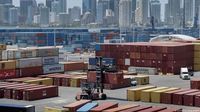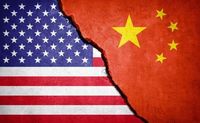In a significant escalation of the ongoing trade war between the United States and China, the U.S. has introduced new tariffs on Chinese imports, raising the total tariff rate to a staggering 104%. This move, which took effect on April 9, 2025, at midnight Eastern Time, has drawn sharp criticism from economists and politicians alike, who warn of potential global economic repercussions.
According to White House Press Secretary Caroline Levitt, the new tariffs consist of an additional 84% charge on imports from China, which follows a previous 20% tariff already in place. Levitt stated, "Beijing made a mistake by taking retaliatory measures, because when America is attacked, it inflicts an even stronger retaliatory strike." This statement underscores the aggressive stance the U.S. is taking in response to China's trade policies.
President Donald Trump, who has been at the forefront of these trade negotiations, refused to delay the implementation of the tariffs, asserting that both Washington and Beijing desire an agreement but are uncertain on how to proceed. He expressed optimism about future negotiations, saying he would show "prosperity when China extends its hand to him," indicating a willingness to negotiate if China takes the initiative.
The backdrop to these new tariffs is a series of escalating trade tensions. Earlier, Trump had announced that if China did not cancel its own tariffs on U.S. goods, which were set at 34%, the U.S. would impose a 50% tariff on Chinese imports. With China failing to meet this deadline, the U.S. has now enforced the new tariffs, signaling a hardline approach to trade negotiations.
As a result of this announcement, U.S. stock indices experienced volatility. The Dow Jones Industrial Average, which had seen gains of 4% earlier in the day, dropped to a mere 1% increase by the time Levitt spoke. Similarly, the S&P 500 index fell from a 3.4% rise to just 0.6% above the previous session's close, while the Nasdaq saw its growth diminish from 3.76% to 0.5%. This market reaction reflects investor concerns about the potential fallout from the heightened tariffs.
In light of these developments, Citi has lowered its forecast for China's economic growth due to the trade war. The financial services firm now predicts a GDP growth rate of 4.2% for China this year, down 0.5 percentage points from previous estimates. Similarly, Natixis has adjusted its forecast to match Citi's, while Morgan Stanley and Goldman Sachs have maintained their projections at 4.5%, albeit with warnings of increased downside risks.
Goldman Sachs has estimated that the initial 50% tariff could reduce China's GDP by 1.5 percentage points, with an additional 0.9 percentage points reduction expected from the subsequent tariff increases. This could have dire implications, as Chinese exports to the U.S. are projected to account for about 3% of China's GDP.
China's own economic targets have also come under scrutiny. In March, the Chinese government announced an official growth target of "around 5%" for 2025, acknowledging the difficulty of achieving this goal amidst the ongoing trade tensions. As the situation evolves, analysts are keeping a close eye on upcoming foreign trade data and GDP figures, with China set to release its foreign trade data for March on April 14 and its first-quarter GDP on April 16.
In response to the economic pressures from the tariffs, China has indicated it may consider cutting interest rates or increasing government spending to stimulate growth. Economists believe the impact of the tariffs is diminishing, suggesting that Beijing may view the situation as a sign that U.S. leverage is reaching its limits.
As the trade conflict continues to unfold, the implications extend beyond just the U.S. and China. The global economy is on alert, with potential increases in consumer prices and a slowdown in growth anticipated worldwide. The recent decisions by the Trump administration have been characterized as the most aggressive steps taken in his trade policy, raising concerns about the broader economic landscape.
Amidst this economic uncertainty, investment options are being scrutinized. The "Money Market" fund from Finam has emerged as a potential avenue for stable passive income, even with small investments. Since its launch, the fund has accumulated over 1 billion rubles under management, with a potential yield of 21% per annum, appealing to those looking to secure their financial positions during turbulent times.
As the situation develops, both U.S. and Chinese officials will need to navigate these turbulent waters carefully. The stakes are high, and the decisions made in the coming weeks could have lasting impacts on the global economy.







